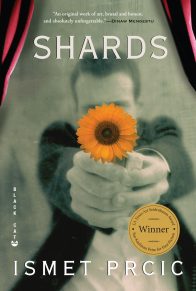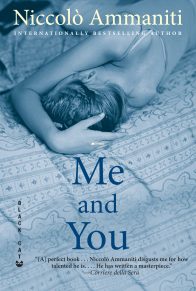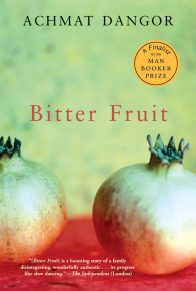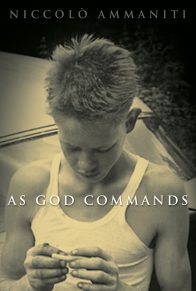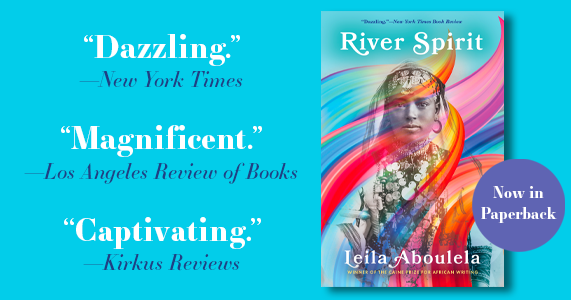The last thing pap” said to me, the last word from his lips, was “Kamchatka”.
He kissed me, his stubble scratching my cheek, then climbed into the Citroen. The car moved off along the undulating ribbon of road, a green bubble bobbing into view with every hill, getting smaller and smaller until I couldn’t see it any more. I stood there for a long while, my game of Risk tucked under my arm, until my abuelo, my grandpa, put his hand on my shoulder and said, “Let’s go home”.
And that’s all there is.
If you want, I can give you more details. Grandpa used to say God is in the details. He used to say a lot of things, like “What Piazzolla plays isn’t tango” and “It’s just as important to wash your hands before you pee as afterwards—you never know what you’ve been touching”, but I don’t think those things are relevant.
We said our goodbyes on the forecourt of a petrol station on Route 3, a few kilometres outside Dorrego in the south of Buenos Aires province. The three of us had had breakfast in the station café, croissants and café con leche in bowls as big as saucepans, with the petrol company logo on them. Mamí was there too, but she spent the whole time in the toilet. She’d eaten something that had upset her stomach and she couldn’t even hold down liquids. And the Midget, my kid brother, was asleep, sprawled on the back seat of the Citroen. He wriggled his arms, his legs, all the time while he was asleep, as though staking his claim, a king of infinite space.
At this moment, I am ten years old. I look normal enough apart from an unruly tuft of hair that sticks up like an exclamation mark.
It is spring. In the southern hemisphere, October days shimmer with golden light and today is no exception; the morning is a palace. The air is filled with fluttering panaderos—dandelion seeds, those daytime stars that in Argentina we call panaderos—or little bakers. I catch them in my cupped palms and, with a puff of breath, set them free again, urging them on to fertile ground.
(The Midget would crack up if he heard me say: “The air is filled with fluttering panaderos.” He’d roll on the ground, clutching his belly, laughing like a lunatic as he imagined tiny men, their brown and white aprons covered in flour, floating like bubbles.)
I can even remember the other people at the petrol station. The petrol pump attendant, a chubby man with a moustache and dark armpits. The driver of the IKA truck, counting a fat wad of banknotes as big as bed sheets on his way to the toilet. (I guess grandpa’s maxim about washing your hands before you pee is relevant after all.) The backpacker with the messianic beard, crossing the forecourt as he heads for the open road, his billycans clanking, like tolling bells calling to repentance.
The little girl sets down her skipping rope to go and wet her hair under the tap. She wrings it dry as she walks back, water dripping onto the dusty forecourt. The drops that just a moment earlier spelled out Morse code in the dust vanish as the seconds pass. Obedient to the call of gravity, they trickle down into the mineral particles, snaking through the spaces that exist where there seemed to be none, leaving behind some part of their moisture to give life to these particles even as they lose themselves on their journey towards the molten heart of the planet, the fire where the Earth still looks as it did when it was first formed. (In the end, we always are what we once were.)
Gracefully, the girl in front of me bends down and, for a minute, I think she is bowing. But in fact she’s picking up her skipping rope. She starts to skip again, a perfect rhythm, the rope whipping through the air, whup, whup, creating the bubble in which she hovers.
Papí opens the door to the station café and lets me go in; grandpa is already inside, waiting for us. His teaspoon creating a whirlpool in his café con leche.
Sometimes there are variations in what I remember. Sometimes mamí doesn’t get out of the Citroen until we leave the café because she’s busy scribbling something on her pack of Jockey Club cigarettes. Sometimes the numbers on the petrol pump run backwards instead of forwards. Sometimes the backpacker gets there before us and by the time we arrive he’s already hitchhiking, as though in a hurry to discover a world he’s never seen, the clank of his billycans pealing out the good news. These variations don’t worry me. I’m used to them. They mean I’m remembering something I hadn’t noticed before; they mean that I’m not exactly the same person I was when last I remembered.
Time is weird. That much is obvious. Sometimes I think everything happens at once, which is anything but obvious and even weirder. I feel sorry for people who brag about “living in the moment”; they’re like people who come into the cinema after the film has started or people who drink Diet Coke—they’re missing out on the best part. I think time is like the dial on a radio. Most people like to settle on a station with a clear signal and no interference. But that doesn’t mean you can’t listen to two or even three stations at the same time; it doesn’t mean synchrony is impossible. Until quite recently, people believed it was impossible for a universe to fit inside two atoms, but it fits. Why dismiss the idea that on time’s radio you can listen to the entire history of humanity simultaneously?
Every day, life gives us an intimation of this. We sense that, inside us, every “we” we once were (and will be?) coexists: the innocent self-absorbed child, the sensual young man generous to a fault, the adult, feet planted firmly on the ground yet still clinging to his illusions, and finally we are the old man who knows that gold is just another metal; as his eyesight fails he has acquired vision. Sometimes, as I remember, my voice is that of the ten-year-old boy I was then; sometimes the voice of the seventy-year-old man I am yet to be; sometimes it is my voice, at the age I am now . . . or the age I think I am. Who I have been, who I am, who I will be are all in continual conversation, each influencing the other. That my past and my present together determine my future sounds like a fundamental truth, but I suspect that my future joins forces with the present to do the same thing to my past. Every time I remember, the person I was speaks his lines, performs his actions with increasing confidence, as though with each performance he grows more comfortable with the role, and understands it better.
The numbers on my petrol pump will start to go backwards. I can’t stop them.
Grandpa is back in his truck, one foot on the running board, softly singing his favourite tango: “Decí, por Dios, que me has dao / que estoy tan cambiao / ¡No sé más quién soy.”
Papí leans down and whispers a last word into my ear. I can feel the warmth of his cheek as I could feel it then. He kisses me, his stubble rasping against my cheek.
“Kamchatka.”
Kamchatka is not my name, but as he says it, I know he is thinking of me.
2
All Things Remote
“Kamchatka” is a strange word. My Spanish friends find it unpronounceable. Whenever I say it, they look at me condescendingly, as though they were dealing with some sort of savage. They look at me and they see Queequeg, the tattooed man from Melville’s novel, worshipping his little idol of some misshapen god. How interesting Moby-Dick would have been narrated by Queequeg. But history is written by the survivors.
I can’t remember a time when I did not know about Kamchatka. At first, it was simply one of the territories waiting to be conquered in Risk, my favourite board game, and the epic sweep of the game rubbed off on the place-name, but to my ears, I swear, the name itself sounds like greatness. Is it me, or does the word “Kamchatka” sound like the clash of swords?
I am one of those people who always hunger for things remote, like Ishmael in Moby-Dick. The magnitude of the adventure is measured by distance: the more distant the peak, the greater the courage needed. In Risk, Argentina—the country where I was born—is on the bottom left of the board, just below the pink lines of the trade winds. In this two-dimensional universe, Kamchatka was the most distant place you could imagine.
At the start of our games, nobody ever fought for Kamchatka. The patriotic coveted South America, the ambitious looked to North America, the cultivated set their sights on Europe and the pragmatic set up camp in Africa and Oceania—easy to conquer and even easier to defend. Kamchatka was in Asia, which was too vast and consequently almost impossible to defend. And as if that wasn’t enough, Kamchatka isn’t even a real country: it exists as an independent nation only in the curious planisphere of Risk, and who wants to conquer a country that isn’t even real?
Kamchatka was left to me; I always had a soft spot for the underdog. To me, Kamchatka boomed like the drums of some secret savage kingdom, calling to make me their king.
At the time I knew nothing about the real Kamchatka, that frozen tongue Russia pokes into the Pacific Ocean, mocking its neighbours. I knew nothing about its eternal snows, its hundred volcanoes; I had never heard of the Mutnovsky glacier or the lakes of acid. I knew nothing of the wild bears, the fumaroles, the gas that bubbles up on the muddy surface of the thermal springs like pustules on a thousand toads. It was enough for me that Kamchatka was shaped like a scimitar and was utterly inaccessible.
Papí would be surprised if he knew how like the real Kamchatka is to the landscape of my dreams: a frozen peninsula, which is also the most active volcanic region on Earth. A horizon ringed by towering, inaccessible peaks shrouded in sulphurous vapours. Kamchatka is a paradox, a kingdom of extremes, a contradiction in terms.
3
I Am Left With No Uncles
On the Risk board, the apparent distance between Argentina and Kamchatka is misleading. When these flat dimensions are mapped onto a globe, this journey, which had seemed impossible, suddenly seems simple. There is no need to traverse the known world to get from one to the other. Kamchatka and the Americas are so close, they all but touch.
Similarly, the goodbyes we said on the forecourt of the petrol station and the beginnings of my story are superposed extremes, each nested inside the other. October sun melds with April sun, this morning blends with that one. It is easy for me to forget that one sun is the promise of summer and the other its farewell.
In the southern hemisphere, April is a month of extremes. Autumn begins and with it comes the cold. But the flurries of wind do not last and the sun always returns in triumph. The days are still long, some seem to have been stolen from summer. Ceiling fans begin their last shifts and people escape to the beach for the weekends as they try to outrun winter.
April 1976, in all its glory, was just like any other. I had just started sixth grade. I was trying to make sense of timetables, to decipher the lists of books I had to get hold of. I still packed more into my schoolbag than I needed and complained that I had to sit too close to Senorita Barbeito’s desk in class.
But some things were different. The military coup, for a start. Although papí and mamí didn’t talk about it much (they didn’t seem angry or upset, simply uncertain), it was obviously something serious. Meanwhile all my uncles were disappearing as if by magic.
Up until 1975, in our house in Flores, people came and went at all hours, talking and laughing loudly, thumping the table when someone said something interesting, drinking mate and beer, singing, playing the guitar and putting their feet up on the rocking chair as though they’d lived here all their lives. Most of them were actually people I’d never seen before and would never see again. When they arrived, papí invariably introduced them as “uncles” and “aunts.” Tío Edward, Tío Alfredo, Tía Teresa, Tío Mario, Tío Daniel. We never remembered their names, but it didn’t matter. The Midget would wait for a few minutes, then amble into the dining room and, in his most innocent voice, say, “Tío, can I have a glass of Coke?” Five men would leap to their feet to get it for him, and they would come back with glasses filled to the brim just in time for us to watch The Saint.
Towards the end of 1975, these uncles gradually began to disappear. Fewer and fewer of them visited us. They didn’t talk so loudly now; they didn’t laugh or sing anymore. Papí didn’t even bother to introduce them.
One day papí told me Tío Rodolfo had died and asked me to come with him to the wake. I said I would, because he’d asked me and not the Midget, given my superior status as older brother.
It was my first wake. Tío Rodolfo lay in the back room in an open coffin. The three or four other rooms were full of angry, single-minded people drinking sugary coffee and smoking like chimneys. I was relieved. I hate it when people cry, and I’d figured that everyone would be bawling their eyes out at a wake. I remember talking to Tío Raymundo (I’d never met him before; papí introduced us when we arrived). Tío Raymundo asked me about school, about where I lived and, without even thinking, I lied. I told him I lived near La Boca. I don’t know why.
Out of sheer boredom, I went over to look in the coffin and discovered that I did know Tío Rodolfo. His cheeks seemed a little more sunken, his moustache a little bigger, or maybe it just looked bigger because in death he appeared thinner, more formal, or maybe he just looked more formal because of the suit and the shirt with the wide collar, but it was definitely Tío Rodolfo. He was one of the few “uncles” who had been to our house more than once and he had always made an effort to be nice to me and the Midget. The last time he visited, he’d given me a River Plate football shirt. When we got home from the wake, I looked in my wardrobe and there it was in its own coffin, second drawer from the bottom.
I didn’t even touch it. I shut the drawer and tried to put it out of my mind, but that night I dreamed the shirt had somehow crawled out of the drawer by itself, slithered over to my bed like a snake, wrapped itself around my neck and tried to choke me. I had that dream several times. And every time I woke up, I felt stupid. How could a River Plate shirt strangle me when I wasn’t even a River Plate supporter?
There were other signs too, but this was the most frightening. Fear had taken root in my own house, in my drawer, carefully folded, smelling of fresh laundry, nestling among the socks.
I didn’t ask papí what Tío Rodolfo died of. I didn’t need to. You don’t die of old age when you’re thirty.






